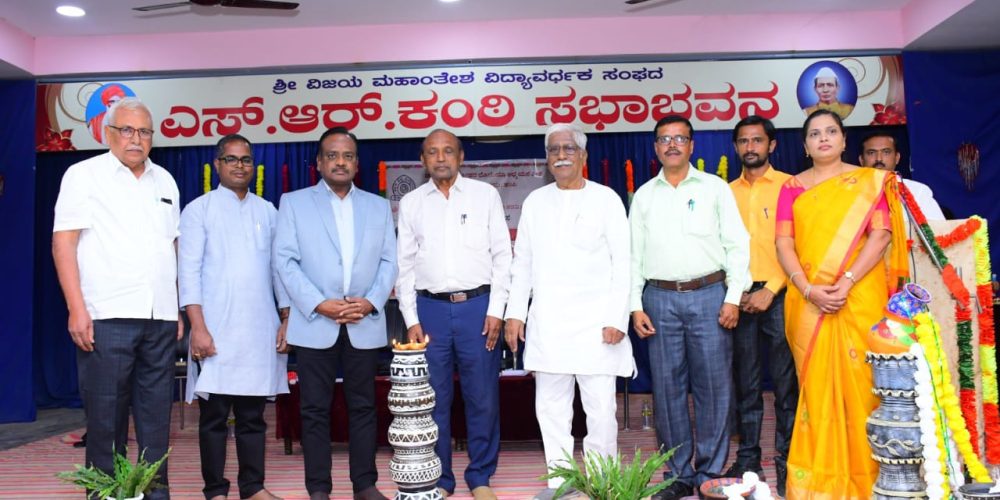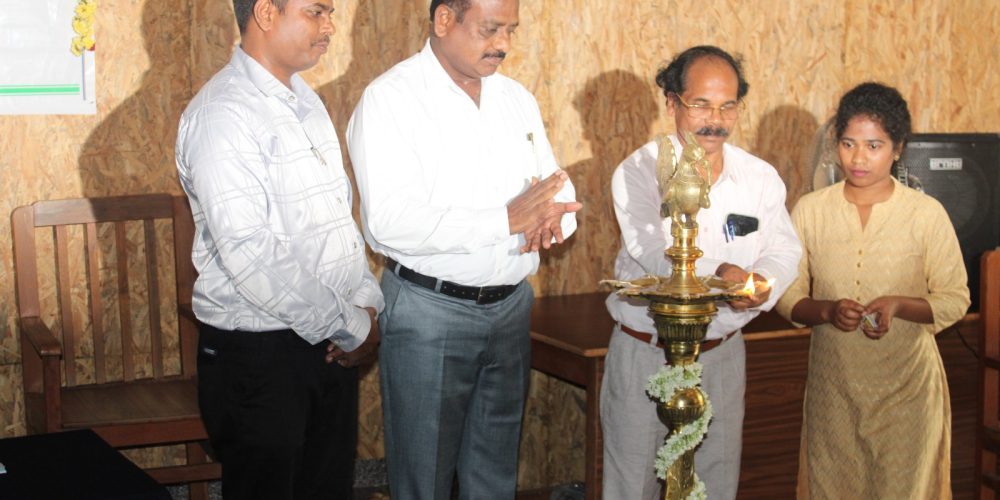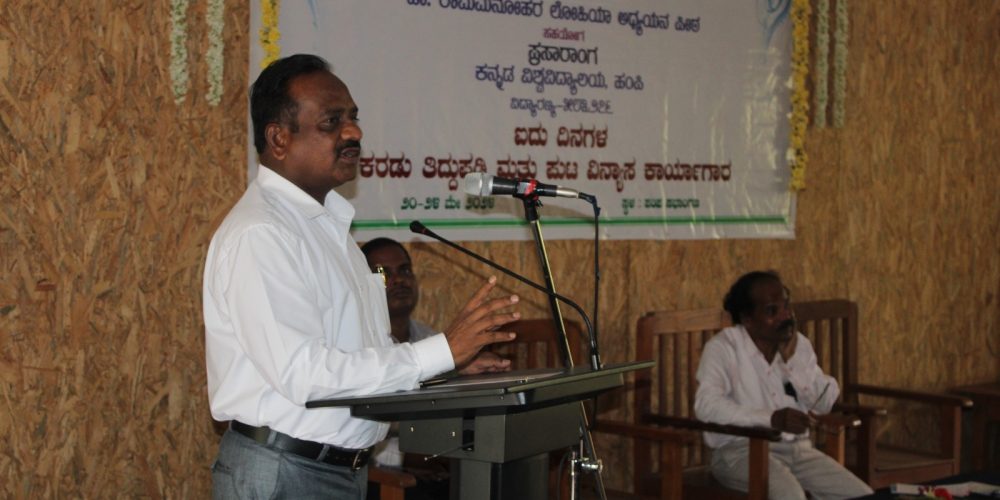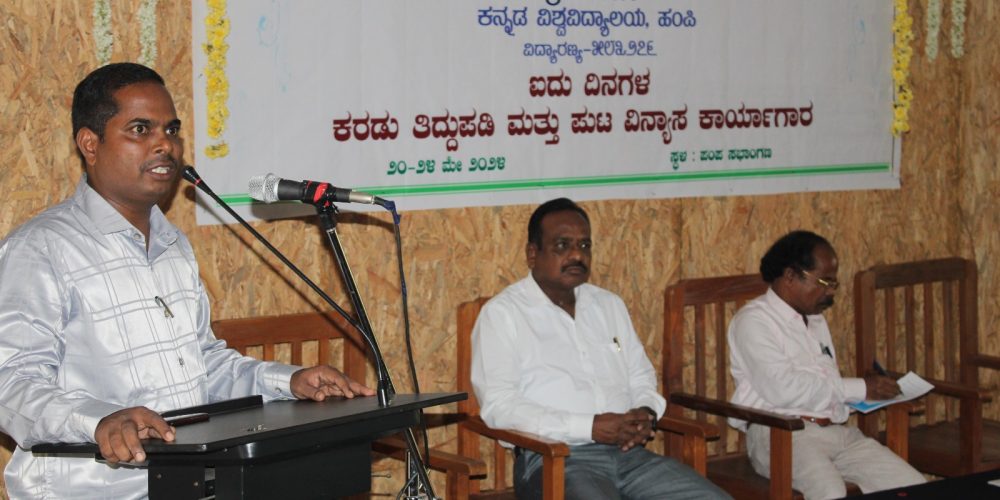Chairs
Dr. Rama Manohara Lohiya Study Chair
Introduction
Kannada University’s Ram Manohara Lohiya Study Chair is one among the many Chairs in the country. This chair is first in Karnataka for receiving grants from Govt. of Karnataka for the establishment of the Chair. Present Coordinator of the chair is Dr. Yerriswamy E. The chair organising various research and extension activities – seminars, conferences, workshops and special lecture series, in-order to impart knowledge about Lohiya’s ideology and contribution to Secular India. Moreover, focus is given to the contemporary relevance of Lohiya’s ideas on scientific temper, egalitarian society and rapid modernization of India. Lohiya’s envisioned a strong, secular modern India with scientific advancement.
Biography of Ram Manohara Lohiya
Lohia was born on 23rd March 1910, at Akbarpur in Faizabad district of Uttar Pradesh. He was one of the few nationalist leaders in the country having his roots in rural India which probably conditioned his thinking process to a great extent and he remained engrossed with such perspectives throughout his life. The nationalist and teaching background of his father seemed to have ingrained two quite significant traits in his personality. First, he was introduced to the niceties of the Indian national movement from a very early age. Second, he was apparently inspired to develop an undiminishing urge for academic pursuits which culminated in earning his doctoral degree from Berlin University in 1932 on the subject of ‘Salt and Satyagraha’.
Lohia’s early initiation in the national movement was marked by two remarkable features. One is going to a meet with Mahatma Gandhi with his father and listening to his views on issues like Satyagraha, non-violence and struggle for the independence of the country. He was so much influenced by Mahatma Gandhi as a result of this meeting; he became a Gandhian and remained so throughout his life. Even in his later ideological explorations, the main tenets of Gandhism remained prominent in his thought and actions. Second feature that initiated him into the national movement at a very tender age was when he organized a small mourning shut-down on the death of Bal Gangadhar Tilak in 1920. His participation in the national movement since then continued unabated, a high point of which was the student protest that he organized in 1928 to protest against the Simon Commission.
In 1929, Lohia left Berlin to pursue his higher studies and remained there till he return to India in 1934. The choice of Germany reflected an aversion to joining any university in Britain, which was at that time the choice of most Indians aspiring for a place in the colonial administration. His sojourn abroad seemingly developed in him a deep interest in India’s relations with the rest of the world. Moreover, his participation in the proceedings of the League of Nations apparently sowed the seeds of internationalism, which later developed in his propagating the idea of world government and international peace. Lohia, though on his return to India joined the Indian National Congress, his exposure to the socialist ideas in Europe as well as his own study of the socio-economic problems of India probably shaped his inclination towards socialism, despite being an ardent Gandhian. Consequently, as mentioned earlier, he helped set up the Congress Socialist Party in 1934. He also, along with Nehru, organized the foreign affairs department of the Congress and became its first secretary.
During the Second World War, his anti-British activities landed him up in jail. In the course of the Quit India movement, when most of the prominent leaders were imprisoned, Lohia became one of the foremost leaders of the movement and broadcast regularly on the Congress radio to disseminate the news of the movement. A remarkable though seemingly incidental event of this time was his struggle for the freedom and civil liberty of the people of Goa in 1946. The subsequent phase of the national movement saw Lohia’s participation in full measures. During this time, he also showed his solidarity with Mahatma Gandhi in his peace missions to communally tensed areas and advocated the peace and unity of the country.
In the post-independence times, Lohia’s growing differences with the Congress leadership led to his quitting the party and eventually setting up the Praja Socialist Party in 1952. Elected as a member of the Lok Sabha in 1963 for the first time, Lohia put his extraordinary oratorical skills to best use on the floor of House to articulate his informed views on the causes and the solution to the problem of poverty in India. Finally, the life of an intellectually versatile and practically tireless crusader for the cause of both national as well as international peace and well-being came to an end on 12 October, 1967. Lohia over a period of time authored a number of books and monographs to propound his ideas and the theories. He left behind a rich and impeccable legacy consisting of a vast range of diversity in its intellectual frame work and wide ranging domain in its functional sphere.
Vision
- To Incorporate Socialism Perspective in Existing all Kannada Knowledge
- To produce and disseminate Equality related knowledge in Kannada
- To create awareness of Secularism and equality
- To Create Research Data Base on Lohia in Karnataka
Mission
- To illustrate Lohiya as a role model for the younger generation.
- To impart knowledge about Lohiya Ideology and contribution to Modern India.
- To disseminate among the younger generation the struggles and sacrifices of Lohiya for India’s Independence.
- To focus on the contemporary relevance of Ram Manohara Lohiya thoughts.
- To inculcate scientific temper in an egalitarian society and modernized India.
- To create a strong academic chair of teaching and learning Lohiya’s social and political philosophy.
- These ideals and values need reiteration, inculcation and adoption in contemporary times for a harmonious living in a strong and secular India.
-
Uniqueness
All discipline faculty member can became director of Lohia Study Chair and every director developing Lohiya’s thoughts from his/her discipline perspective.
-
Major Programs
To realize the aforesaid objectives, the Chair of Lohiya Studies is engaging itself in a series of activities which include conducting National Seminars, Lecture Series and preparing documentation on Lohiyaby collecting books, Philately on Lohiya.
Major Contribution of the Chair
The chair published nine books on Lohiya thoughts. These books are for Kannada readers. They are as follows:
| Sl. No. | Title of the Book | Author/ Editor | Year | Pages | Price |
| 1. | Raajakeeyada Madhya Biduvu | Dr. Nataraj Huliyar | 2022 | xxii+268 | Rs.240/- |
| 2. | Jaati Paddhati (Kannada Translaion of Ram Manohar Lohia’s the Caste System | Dr. Nataraj Huliyar | 2022 | xxi+168 | Rs.160/- |
| 3. | Shanthaveri Gopalgowda Nenapina Samputa | Prof. Kalegowda Nagavara, Dr. G. V. Ananda Murthy | 2019 | 44+668 | Rs.600/- |
| 4. | Lohiya: Varthamanada Mukhamukhi | Dr. A. S. Prabakar Dr. Sripada Shetty (Edit) |
2012 | 46+570 | Rs.300/- |
| 5. | Samajavaadi Horaatagaarara Sandarshana Samputa -1 | B. Peer Bhasha | 2012 | L+320 | Rs.200/- |
| 6. | Samajavadigala Nenapina samputa – 2 | Vaddagere Nagarajayya (Edit) | 2012 | XXXIII+411 | Rs.260/- |
| 7. | Ram Monohara Lohiya Chintane | Dr. NatarajHuliyar (Edit) | 2010 | 20+336 | Rs.300/- |
| 8. | Sonduru Bhoohoaraata | Arun Joladakudligi | 2007 | XVIII+174 | Rs.80/- |
| 9. | Hebballi Bhoohoraata | Dr. Satish Patil | 2007 | Xii+52 | Rs.35/- |
Details of the Faculty
| Name | Qualification | Years of Service |
|---|---|---|
| Dr. Yerriswamy E. Assistant Professor Dept. of Women’s Studies Kannada University, Hampi Vidyaranya – 583276 Email ID: yerriswamy91@gmail.com | M.A. (Women’s Studies) M.A (Sociology) Ph.D. (Women’s Studies) NET and K-SET (Women’s Studies) K-SET (sociology) (Ph.D. - Sociology) | 08 |
Conferences/ Seminars / Workshops/ Endowment Lectures etc. Organised by the Department.
02. 2023-2024
| Name of the Organiser | Title of the Seminar | Collaboration | Venue | Date |
| Dr. Yerriswamy E. | Special Lecture on socialist philosophy, Theory and power | — | Online | 10.12.2024 |
| Dr. Yerriswamy E. | Five days workshop on Proof Reading and Layout | Prasaranga, Kannada University, Hampi | Pampa Sabhangana | 20.05.2024 |
| Dr. Yerriswamy E. | Special Lecture on Lohia and Women | Sri Gavisiddheshwar College of Arts, Science and Commerce, Koppala | Sri Gavisiddheshwar College of Arts, Science and Commerce, Koppala | 30.12.2023 |
| Dr. Yerriswamy E. | Special Lecture on Lohia: Postcolonial Thoughts | S.E.V.S.S. Government Pre-University College for Girls, Kampli | S.E.V.S.S. Government Pre-University College for Girls, Kampli | 15.12.2023 |
| Dr. Yerriswamy E. | Special Lecture on Lohia’s Cultural Significance | Sri Vijaya Mahantesh College of Arts and Commerce for Women, Illakal | Sri Vijaya Mahantesh College of Arts and Commerce for Women, Illakal | 14.12.2023 |
| Dr. Yerriswamy E. | Sri Narayana Guru in the Indian philosophical tradition | Viveka Vedike, Hospet | Mantapa | 08.09.2022 |
| Dr. Yerriswamy E. |
On the occasion of 75th Independence Day special lecture on Freedom Movement and Socialist Perspective
|
— | Bhuvana Vijaya, KUH | 15.08.2022 |
| Dr. Yerriswamy E. | On the occasion of Mahatma Gandhi Jayanti special lecture on Mahatma Gandhi and Karnataka | — | Bhuvana Vijaya, KUH | 02.10.2021 |
| Dr. Yerriswamy E. | International Translation Day |
Department of Translation Studies, KUH
|
Department of Translation Studies, KUH | 30.09.2021 |
| Dr. Yerriswamy E. |
Special Lecture on Translations of Gandi and Lohiya in Kannada
|
Department of Translation Studies | Nudi Building, KUH | 25.03.2021 |
| Dr. Yerriswamy E. | On the occasion of Lohiya Birth anniversary special lecture on Lohiya and Women | — | Online | 23.03.2021 |
| Dr. Yerriswamy E. | On the occasion of 72nd Republic Day special lecture on Constitution and Federal System | — | Online | 26.01.2021 |
| Dr. Yerriswamy E. |
On the occasion of Mahatma Gandhi Jayanti special lecture on Mahatma Gandhi and Present Context
|
— | Bhuvana Vijaya, KUH | 02.10.2020 |
| Dr. Yerriswamy E. |
One Day National Webinar on Theoretical Aspects of Lohia Thoughts
|
— | Online | 06.08.2020 |
| Dr. Yerriswamy E. |
One Day National Webinar on Socialism and Lohiaism: Present Context |
Internal Quality Assurance cell, KUH | Online | 08.07.2020 |
| Dr. Yerriswamy E. | Special lecture on Lohiya’s Social Thoughts | Kamala Neharu Smaraka Rastriya Mahila College, Shivamogga |
Conference Hall, Kamala Neharu Smaraka Rastriya Mahila College, Shivamogga
|
11.02.2020 |
| Dr. Yerriswamy E. | Special lecture on Contemporary Context of LohiyaIsam |
Santa Aloysius (autonomous) college, Mangalore
|
Robert Secquare hall, Santa Aloysius (autonomous) college, Mangalore
|
22.01.2020 |
| Dr. Yerriswamy E. |
On the occasion of Mahatma Gandhi Jayanti special lecture on Gandhi and Gram Swaraj
|
Gram DattuYojane, KUH | Mantapa, KUH | 02.10.2019 |
| C. Venkatesh | Relevance of Socialism | — | Kannada University, Hampi | 23.03.2017 |
| Dr. A. Sridhar | Special Lecture on Lohiya Thoughts | LohiaPratishatna, Raichur | Govt. first Degree college, Raichur | 23.2.2013 |
| Dr RahmathTarikere | Workshop on Manuscripts Review | — | Kannada University, Hampi | 01.02.2007 |
| Dr RahmathTarikere |
Special Lecture on Polarisation of Dalit’s and OBC caste’s |
— | Kannada University, Hampi | 09.12.2005 |
| Dr. B.M. Puttaiah | Workshop on Social Justice | Devaraj Arsu Research Institute, Mysore | Kannada University, Hampi | 19.09.2003 |
| Dr. B.M. Puttaiah | Workshop onLohiya Thoughts | — | Kannada University, Hampi | 06.01.2003 |
| Dr. B.M. Puttaiah | Seminar on Backward Movements in Karnataka | — | Kannada University, Hampi | 31.08.2002 |
Photo Gallery
Contact Us
Dr. Yerriswamy E.
Assistant Professor
Dept. of Women’s Studies
Kannada University, Hampi
Vidyaranya – 583276
Email ID: yerriswamy91@gmail.com
Mobile : 9481715062




